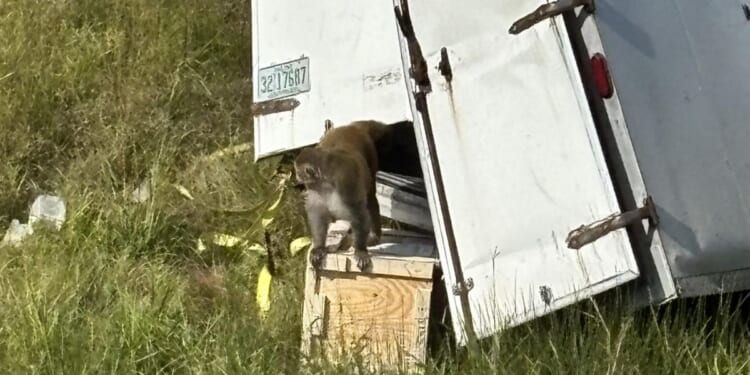For anyone who’s seen 2002 horror film “28 Days Later,” what follows will all sound a little too eerily familiar for you.
For those who haven’t seen that seminal film — you really should — it doesn’t make the story any less disturbing.
According to multiple reports, a truck full of monkeys flipped over on a Mississippi highway, freeing multiple rhesus monkeys.
Over the course of several Facebook posts, the Jasper County Sheriff’s Department provided some more details.
“Do not approach the monkeys if you see one,” the initial post warns. “Call 911. They do pose potential health threats and are aggressive.”
“On 10/28/25 a wreck occurred on I59 near mile marker 117,” the sheriff’s department posted in a follow-up. “This was a truck carrying Rehsus monkeys from Tulane University. The monkeys are approximately 40lbs, they are aggressive to humans and they require PPE [personal protective equipment] to handle.”
The PPE, in particular, raised quite a few eyebrows as the story began making the rounds.
The reason for the PPE recommendation? “The monkeys carry hepatitis C, herpes, and COVID. Tulane University has been notified and will send a team to pick up the monkeys tomorrow (the ones that are still caged).”
According to the most recent update from the sheriff’s office, all the monkeys that escaped — save for one — “have been destroyed.”
It is unclear how many monkeys escaped, how many were killed, and how many remained in cages.
While many of the facts remain murky, Tulane did issue a statement to try and quell any potential panic (or “28 Days Later” truthers). The Jasper County Sheriff’s Department shared that statement, as well as an explanation for its initial assessment of these allegedly diseased monkeys.
“Tulane has released the statement below,” the sheriff’s office posted. “The driver of the truck told local law enforcement that the monkeys were dangerous and posed a threat to humans. We took the appropriate actions after being given that information from the person transporting the monkeys. He also stated that you had wear PPE equipment to handle the monkeys.”
Tulane, meanwhile, stated: “Non-human primates at the Tulane National Biomedical Research Center are provided to other research organization to advance scientific discovery.”
“The primates in question belong to another entity and are not infectious. We are actively collaborating with local authorities and will send a team of animal care experts to assist as needed.”
Advertise with The Western Journal and reach millions of highly engaged readers, while supporting our work. Advertise Today.












